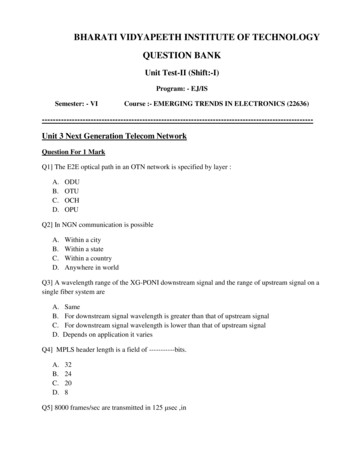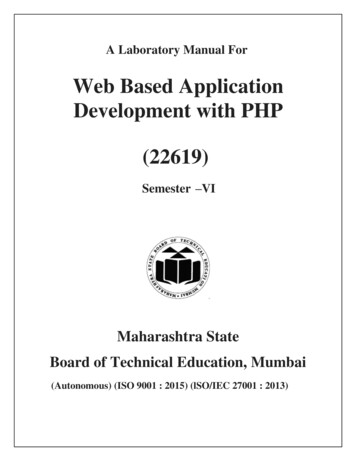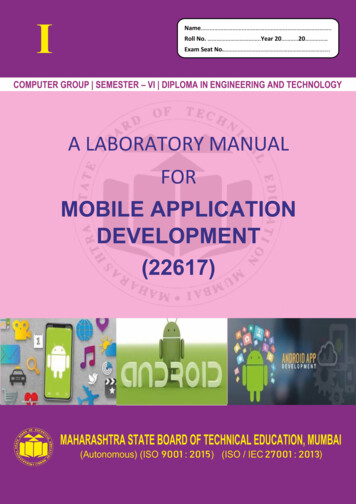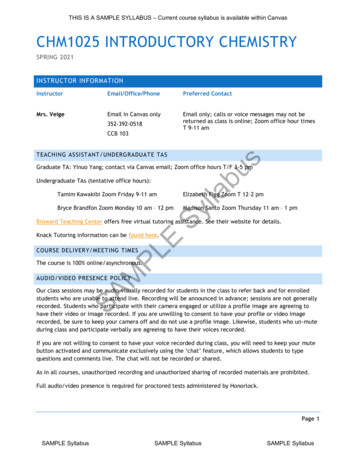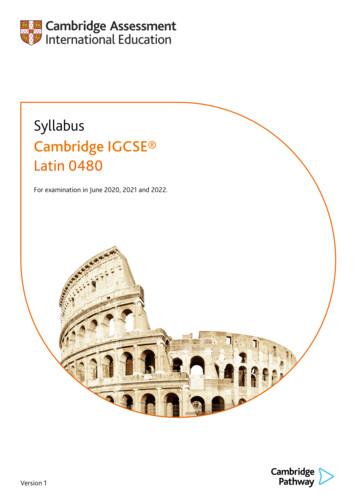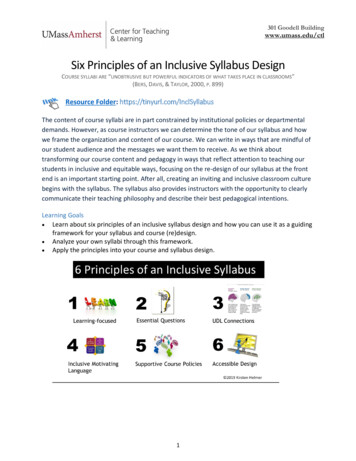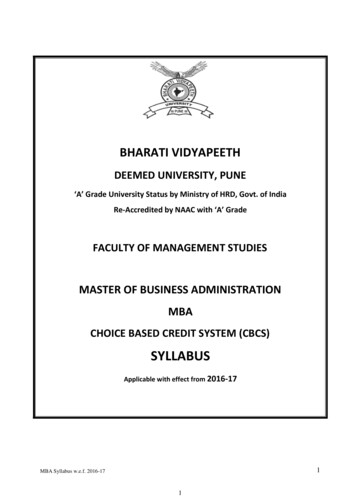
Transcription
BHARATI VIDYAPEETHDEEMED UNIVERSITY, PUNE‘A’ Grade University Status by Ministry of HRD, Govt. of IndiaRe-Accredited by NAAC with ‘A’ GradeFACULTY OF MANAGEMENT STUDIESMASTER OF BUSINESS ADMINISTRATIONMBACHOICE BASED CREDIT SYSTEM (CBCS)SYLLABUSApplicable with effect from 2016-171MBA Syllabus w.e.f. 2016-171
nale for Syllabus RevisionVision Statement of the ProgrammeObjectives of the ProgrammeLearning Outcomes FROM THE MBA(General)ProgramEligibility for AdmissionStructure of the ProgrammeCreditsScheme of ExaminationGrading SystemStandard of PassingAward of HonoursATKT RulesDual SpecializationSummer InternshipQuestion Paper PatternStructureList of Elective GroupsContents of the Syllabus – Semester IContents of the Syllabus – Semester IIContents of the Syllabus – Semester IIIContents of the Syllabus – Semester IVPage No.3333344445557789 -101112-1415-1618 – 4244 – 6566 - 131133-1892MBA Syllabus w.e.f. 2016-172
BHARATI VIDYAPEETH DEEMED UNIVERSITY, PUNEFaculty of Management StudiesMaster of Business Administration (MBA-General)Revised Course Structure (To be effective from 2016-2017)I.Title:a) Name of the Programme: Master of Business Administration (General)b) Nature & duration of the Programme: FULLTIME Post-Graduate Degree Programme ofTWO YEARS (approved by AICTE).II.Introduction :The Master of Business Administration (General) is a full time two-year program offeredby Bharati Vidyapeeth Deemed University (BVDU), Pune and conducted at itsManagement Institutes in Pune, New Delhi, Karad, Kolhapur, Sangli, and Solapur. All thesix institutes have experienced faculty members, excellent Laboratories, Library, and otherfacilities to provide proper learning environment to the students.III.Rationale for Syllabus revision:The Vision and Mission statements of the MBA (General) program embodies the spirit ofthe mission of the University and vision of Hon‟ble Dr. Patangraoji Kadam, the Founderof Bharati Vidyapeeth and Chancellor, Bharati Vidyapeeth University, which is to usher in“Social Transformation through Dynamic EducationIn view of the dynamic nature of the market, economy and evolving expectations of thestakeholders such as students, faculty members and industry in particular, the MBA(General) Programme Syllabus was revised in the year 2012-13 with the introduction ofChoice Based Credit System(CBCS).Over the past four years, feedback was received from various stakeholders and keeping inmind the experience with the CBCS implemented in the year 2012-13, need was felt torevise the syllabus so as to match the requirements of the industry and society. Thisrevised draft is the result of inputs received from the industry, academia, alumni and allstakeholders.IV.Vision Statement of MBA (General) Program :To facilitate creation of Dynamic and Effective Business Professionals, Managers andEntrepreneurs who can transform corporate sector that caters to the needs of the societyand contribute towards Nation building.V.Objectives of the MBA (General) Program :At Bharati Vidyapeeth Deemed University the objective of MBA (General) Program is toprovide world class Business Education. The Program aims to improve Business DecisionMaking Capabilities of upcoming Managers by enhancing their Analytical Skills.3MBA Syllabus w.e.f. 2016-173
VI. VII.Learning Outcomes FROM THE MBA(General) Program :At the end of the course the student should be able to: Analyze problems and come up with effective solutions to resolve them. Learn new technologies with ease and be productive at all times Read, write, and contribute to Business literature To Develop Team Spirit. Be a good citizen in all respects. Eligibility for Admission to this Course :Admission to the course is open to any graduate (10 2 3) of any recognized universitysatisfying the following conditions:1. The candidate should have secured at least 50% (45% for SC/ST) in aggregate atgraduate level university examination.2. The Candidate applying in final year of bachelor‟s degree may also apply. Admissionof such candidates will remain provisional until submission of final result certificatesin original.3. Subject to the above conditions, the final admission is based solely ona) The merit at the All India entrance test (B-MAT) followed by Group Discussion &Personal Interview conducted by Bharati Vidyapeeth University, Pune.b) Submission of Migration Certificate, Transference Certificate, anti raggingaffidavit etc.VIII. Structure of the Program :IX.The MBA-General programme is of 120 credits which need minimum two years dividedinto four semesters to complete. During third semester students have to opt forspecialization(s) and study the Units in the specialization in depth. The course alsoincludes Internship / Summer Training of 50 days. The medium of instruction andexamination will be only English. A student would be required to complete the coursewithin five academic years from the date of admission.Credits:The definition of credits is based on the following parameters;i) Learning hours put in by the learnerii) Learning outcomesiii) Contents of the syllabus prescribed for the course etc.In this system each credit can be described as a combination of 03 (THREE) componentssuch as Lectures (L) Tutorials (T) Practice (P).These components are further elaborated for an effective teaching learning process; Lectures (L): Classroom lectures delivered by Faculty member in an interactivemode. Tutorials (T): Sessions that includes participatory discussions, presentations by thestudents, case study discussions etc. Practice (P): It includes LAB sessions for IT related courses & BusinessCommunication practice sessions for courses like Accounts, Mathematics,Statistics and field assignments etc. 4MBA Syllabus w.e.f. 2016-174
In terms of a Semester of 15 (FIFTEEN) weeks,a) Every ONE hour session per week of Lecture (L) 01(one) credit per Semesterb) TWO hour sessions per week of Tutorial (T) 01(one) credit per Semesterc) TWO hour sessions per week of Practice (P) 01(one) credit per Semester1. A) Scheme of Examination:Courses having Internal Assessment (IA) and University Examinations (UE) shall beevaluated by the respective institutes and the University at the term end for 40(forty) and60(Sixty) Marks respectively. The total marks of IA and UE shall be 100 Marks and it willbe converted to grade points and grades.Courses having only Internal Assessment (IA) the respective institutes will evaluate thestudents in various ways such as Class Test, Presentations, Field Assignments and MiniProjects for a total of 100 marks during the term. Then the marks will be converted tograde points and grades.Open Courses shall be evaluated for 50 marks only (fifty marks only).B) Components of continuous evaluation system:Following are the suggested components of CES,a)b)c)d)e)f)g)h)Case Study/Caselet/Situation Analysis- (Group Activity or Individual Activity)Class TestField AssignmentRole playIndustry Analysis (Group Activity or Individual Activity)Business planQuizWorkbook / scrapbook2. Grading System for Programmes under Faculty of Management Studies:The Faculty of Management Studies, Bharati Vidyapeeth University has suggested the use ofa 10-point grading system for all programmes designed by its different Board of Studies.Standard of Passing:For all courses, both UE and IA constitute separate heads of passing (HoP). In order to pass insuch courses and to earn the assigned credits, the learner must obtain a minimum grade point of5.0 (40% marks) at UE and also a minimum grade point of 5.0 (40% marks) at IA.If learner fails in IA, the learner passes in the course provided, he/she obtains a minimum 25%marks in IA and GPA for the course is at least 6.0 (50% in aggregate). The GPA for a coursewill be calculated only if the learner passes at UE.A student who fails at UE in a course has to reappear only at UE as backlog candidate and clearthe Head of Passing. Similarly, a student who fails in a course at IA he has to reappear only atIA as backlog candidate and clear the Head of Passing. to secure the GPA required for passing.5MBA Syllabus w.e.f. 2016-175
The 10 point Grades and Grade Points according to the following tableRange of Marks (%)GradeGrade Point80 Marks 100O1070 Marks 80A 960 Marks 70A855 Marks 60B 750 Marks 55B640 Marks 50C5Marks 40D0The performance at UE and IA will be combined to obtain GPA (Grade Point Average) for thecourse. The weights for performance at UE and IA shall be 60% and 40% respectively.GPA is calculated by adding the UE marks out of 60 and IA marks out of 40.The total marksout of 100 are converted to grade point, which will be the GPA.Formula to calculate Grade Points (GP)Suppose that „Max‟ is the maximum marks assigned for an examination or evaluation,based on which GP will be computed. In order to determine the GP, Set x Max/10 (sincewe have adopted 10 point system). Then GP is calculated by the following formulasRange of MarksFormula for the Grade Point8x Marks 10x105.5x Marks 8xTruncate (M/x) 24x Marks 5.5xTruncate (M/x) 1Two kinds of performance indicators, namely the Semester Grade Point Average (SGPA) andthe Cumulative Grade Point Average (CGPA) shall be computed at the end of each term. TheSGPA measures the cumulative performance of a learner in all the courses in a particularsemester, while the CGPA measures the cumulative performance in all the courses sincehis/her enrollment. The CGPA of learner when he /she completes the programme is the finalresult of the learner.The SGPA is calculated by the formulaSGPA Ck * GPk,, Ckwhere, Ck is the Credit value assigned to a course and GPk is the GPA obtained by the learnerin the course. In the above, the sum is taken over all the courses that the learner hasundertaken for the study during the Semester, including those in which he/she might havefailed or those for which he/she remained absent. The SGPA shall be calculated up to twodecimal place accuracy.6MBA Syllabus w.e.f. 2016-176
The CGPA is calculated by the following formulawhere, Ck is the Credit value assigned to a course and GPk is the GPA obtained by the learnerin the course. In the above, the sum is taken over all the courses that the learner hasundertaken for the study from the time of his/her enrollment and also during the semester forwhich CGPA is calculated. The CGPA shall be calculated up to two decimal placeaccuracy.The formula to compute equivalent percentage marks for specified CGPA:% marks (CGPA)If 5.00 CGPA 6.00If 6.00 CGPA 8.00If 8.00 CGPA 9.00If 9.00 CGPA 9.50If 9.50 CGPA 10.0010 * CGPA-105 * CGPA 2010 * CGPA-2020 * CGPA-11040 * CGPA-300Award of Honours:A student who has completed the minimum credits specified for the programme shall bedeclared to have passed in the programme. The final result will be in terms of letter grade onlyand is based on the CGPA of all courses studied and passed. The criteria for the award ofhonours are given below.Range of CGPA Final Grade Performance Descriptor Equivalent Range of Marks (%)9.5 CGPA 10OOutstanding80 Marks 1009.0 CGPA 9.49A Excellent70 Marks 808.0 CGPA 8.99AVery Good60 Marks 707.0 CGPA 7.99B Good55 Marks 606.0 CGPA 6.99BAverage50 Marks 555.0 CGPA 5.99CSatisfactory40 Marks 50CGPA below 5.0FFailMarks below 403. ATKT Rules:A student is allowed to carry any number of backlog papers of Semester I and Semester IIwhile going into Semester III. However, a student must clear all papers of Semester I andSemester II so as to become eligible for appearing in Examinations at Semester IV.7MBA Syllabus w.e.f. 2016-177
Dual Specialization:4.M.B.A. programme 2016-17 offers Dual Specialization to the students in second year of MBAProgramme. Under dual specialization students are required to select any Two SpecializationGroups from the list given below in 4.2.4.1 Prerequisite for offering a combination of Specialization Groups There must be minimum 15 (fifteen) students for a particular combination of specializationgroups 4.2 Specialization Combinations:Specializations may be chosen from the following combinations;Specialization ChoicesMarketing ManagementFinancial ManagementHuman Resource ManagementInformation Technology ManagementInternational Business ManagementProduction & Operations ManagementAgribusiness ManagementRetail Management8MBA Syllabus w.e.f. 2016-178
5. Summer Internship :At the end of Semester II, each student shall undertake Summer Internship in an Industry for50 (Fifty Days). It is mandatory for the students to seek written approval from the FacultyGuide about the Topic & the Organisation before commencing the Summer Internship.During Summer Internship students are expected to take necessary guidance from the facultyguide allotted by the Institute. To do it effectively they should be in touch with their guidethrough e-mail or telecon.Summer Internship Project should be a research project or it may be an operationalassignment that involves working by the students in an organization.In case of an operational assignment1) Students are expected to do a project work in an organization wherein they are doingSummer Internship.2) The students should identify specific problems faced by the organization in a functionalarea in which the assignment is given.e.g.a) Sales - sales targets are not achieved for a particular product or service in a givenperiod of time.b) Finance – mobilization & allocation of financial resources.c) HR – Increase in employee turnover ratio.3) In this study students should focus on Identifying the reasons / factors responsible for the problems faced by theorganization Collection of data(Primary & Secondary) related to reasons /factors responsiblefor these problems Data Analysis tools & interpretation Findings & observations. Suggestions (based on findings & observations) for improving the functioning ofthe organization. The learning outcomes and the utility to the organization must be highlighted in SummerInternship Project Report.4) General chapterization of the report shall be as under;1) Introduction and Literature Review: - This chapter will give a reader thebackground of problem area, specific problem & how you come across it?2)3)4)5)6)Company profile: Objectives of the study:Data collection: Data analysis & interpretation: Findings & observations: -7) Suggestions: Annexure: Questionnaire References. 9MBA Syllabus w.e.f. 2016-179
5.Technical details :1. The report shall be printed on A-4 size white bond paper.2. 12 pt. Times New Roman font shall be used with 1.5 line spacing for typing thereport.3. 1” margin shall be left from all the sides.4. Considering the environmental issues, students are encouraged to print on bothsides of the paper.5. The report shall be hard bound as per the standard format of the cover page givenby the Institute and shall be golden embossed.6. The report should include a Certificate (on company‟s letter head) from thecompany duly signed by the competent authority with the stamp.The report shall be signed by the respective guide(s) & the Director of the Institute10 (Ten) days before the viva-voce examinations.7. Student should prepare two hard bound copies of the Summer Internship ProjectReport and submit one copy in the institute’s Library. The other copy of the reportis to be kept by the student for their record and future references.8. In addition to this students should prepare two soft copies of their SIP reports &submit one each in Training & Placement Department of the Institute & LibraryThe Summer Internship shall be assessed out 100 Marks. The break up of these marks is as under;Viva- voce examination 60 (Sixty) MarksSummer Internship 40 (Forty) MarksReport---100 (Hundred) MarksThere shall be a viva-voce of Summer Internship Project Report for 60 marks. The examiners‟panel shall be decided as per the guidelines received from the University.The viva –voce shall evaluate the project based oni.ii.iii.iv.Actual work done by the student in the organizationStudent‟s knowledge about the company & Business EnvironmentLearning outcomes for the studentUtility of the study to the organization10MBA Syllabus w.e.f. 2016-1710
6.Question Paper Pattern for University ExaminationsThe pattern of question paper for the courses having University Examinations will be asfollows:Title of the CourseDay:Total Marks: 60Date:Time: 03 HoursInstructions:a. Attempt any THREE questions from Section I. Each question carries 10 Marks.b. Attempt any TWO questions from Section II. Each question carries 15 Marks.c. Answers to both the Sections should be written in the SEPARATE answer book.SECTION - IIt should contain 05 questions covering the syllabus & should test theconceptual knowledge of the students.QuestionQ.1Q.2Q.3Q.4Q.5.Write Short Notes on ANY TWOMarks(10 marks)(10 marks)(10 marks)(10 marks)(10 marks)SECTION – IIIt should contain 03 questions covering the entire syllabus & should be based onapplication of the ConceptsQ.6.Q.7.Q.8(15 marks)(15 marks)(15 marks)7. Structure of the SyllabusThe MBA Programme as per Semesters, Credits and Marks is as ks Distribution90090011008003700The detailed structure is as follows11MBA Syllabus w.e.f. 2016-1711
MBA Sem ICreditsL/WT or PWManagement Concepts & ApplicationsManagerial EconomicsFinancial & Management AccountingOrganizational BehaviourStatistical TechniquesLegal Aspects of BusinessBusiness CommunicationInformation Technology Skills for ManagersOpen 1323Open 2Course CodeSemester – I101102103104105106107108See GroupsSee GroupsTotal No. of CreditsUECETotalMarksExaminationPattern26040100UE &CE226040100UE &CE4326040100UE &CE3226040100UE &CE4326040100UE &CE3226040100UE &CE3226040100UE &CE32122-10050100CE50CE212-5050CE302020900-2/Open Courses: Students can opt any two courses from the following1O9110111112113114115116Soft Skills (Includes etiquettes, table manners, public speaking & presentation skills etc.)Waste ManagementLife Management SkillsEvent ManagementSocial Media ManagementCurrent AffairsData Analysis Using Software Tools (MS Excel / SPSS)Supply Chain Management** In addition to the above, Cyber Security is an Add on Course having 02 (TWO) credits may be offered by the InstituteMBA (G) SEM IICourse CodeSemester II201202203204205206207208See GroupSee GroupMarketing ManagementFinancial ManagementHuman Resource ManagementInternational BusinessProduction & Operations ManagementResearch MethodologyBusiness EnvironmentBusiness Ethics & Corporate GovernanceOpen 1Open 2Total No. CreditsOpen Courses: Any two courses from the minationPattern26040100UE &CE226040100UE &CE3226040100UE &CE3226040100UE &CE3226040100UE &CE3226040100UE &CE3226040100322-100100UE &CECE212-5050CE212-5050CE281820CreditsL/W323T or PW/900Soft Skills (that includes Logical reasoning & Aptitude tests, Interview techniques, Group Discussion etc.)Introduction to Business AnalyticsData Analysis Using Software Tools (MS Excel/SPSS)E-commerce ApplicationsSocietal Concerns and NGO OperationsForeign LanguageSix SigmaEnterprise Resource Planning (ERP)12
MBA (General) SEM IIICourseCode301302303See groupsSee groupsSee groupsSee groups304305See GroupSee GroupSee GroupSee GroupSemester –IIICreditsL/WT or P/WUECETotalMarksExamination Pattern3333333226040100UE &CE226040100UE &CE226040100UE &CE3-6040100UE &CE3-6040100UE &CE3-6040100UE &CE3-6040100UE &CE--6040100Viva – Voce &ReportStrategic ManagementOperations Research*Entrepreneurship DevelopmentSpecialization I - E-(i)Specialization I - E-(ii)Specialization II - E-(i)Specialization II - E-(ii)** Summer InternshipInnovation, Technology & ChangeManagementOpen Elective1Open Elective 2Open Elective 3Open Elective 4Total No. of 050CE1505024161100-CEOpen Courses: Any TWO COURSES from the specialization groups opted by the students.Open Courses under Marketing Management306Digital Marketing307Customer Relationship Management308Marketing ResearchOpen Courses under IT Management322IT in BFSI Domain323Legal Aspects of IT & IT Strategies324Software Quality Standards & ProcessDocumentation309Product & Brand Management325Cloud Computing for ManagersOpen Courses under Financial ManagementOpen Courses under Production & Operations Management310Corporate Taxation326Materials Management311Capital Market Operations327Maintenance Management312Financial Risk Management328World Class Manufacturing313Financial Statement Analysis329Business Process Re-engineeringOpen Courses under Human Resource Management Open Courses under Agribusiness Management314Industrial Relations330Rural Banking315QMS & Innovation Management331Agriculture Marketing & Price Analysis316e-HRM332Commodity Market317Public Relations & Corporate333Indian Agriculture & World Trade OrganisationCommunicationOpen Courses under IB ManagementOpen Courses under Retail ManagementHRM in Retail318Global Logistics & Supply Chain334Retail Stores and Operations335ManagementInternational Retailing319International Economics336Information Technology in Retailing320Currency, Derivatives & Risk337Management321Global Strategic Management13
MBA (General) SEM IVT or P /Course Code401See groupsSee groupsSee groupsSee groups402See GroupSee GroupSee GroupSee GroupSemester IVCreditsProject ManagementSpecialization I - E-(iii)Specialization I - E-(iv)Specialization II - E-(iii)Specialization II - E-(iv)Environment & Disaster ManagementOpen 1Open 2Open 3Open 4Total No. Of 100UE &CE33-6040100UE &CE33-6040100UE &CE33-6040100UE &CE33-6040100UE 050CE800-262012Open Courses: Any TWO COURSES from the specialization groups opted by the students.Open Courses under Marketing Management403Strategic Marketing404Retail Marketing405Marketing of Financial Services406Social Media MarketingOpen Courses under Financial Management407Management Control System408Indirect Taxes409Banking Operations410Financial Modeling Using MS ExcelOpen Courses under Human Resource Management411Labour WelfareManagerial Competencies & Career412Development413HR Lab414HR AnalyticsOpen Courses under IB Management415Global Business Environment416Foreign Exchange Management417International Marketing Research418International Financial ManagementOpen Courses under IT Management419Big Data Analysis420IT Infrastructure Management421Technology Management & IT Services422Lab on Oracle & Open Source SoftwareOpen Courses under Production & Operations Management423Negotiation Management424Service Operations Management425Environment , Health & Safety426Quality Management StandardsOpen Courses under Agribusiness Management427MicrofinanceRural Entrepreneurship428429430Agriculture & Indian EconomyMarketing of Agro ProductsOpen Courses under Retail ManagementContemporary Retail Management431Retail Planning432Retail & Distribution Management433Rural Retailing43414
LIST OF ELECTVE GROUPSElective I: Marketing ManagementPaper no.MK01MK02MK03MK04Sem IIIName of the CourseConsumer BehaviourServices MarketingSem IVSales & Distribution ManagementIntegrated Marketing CommunicationElective II: Financial ManagementPaper no.FN01FN02FN03FN04Sem IIIName of the CourseInvestment Analysis & Portfolio ManagementManagement of Financial ServicesSem IVCorporate FinanceInternational Financial ManagementElective III: Human Resource ManagementPaper no.HR01HR02HR03HR04Sem IIIName of the CourseTraining & DevelopmentLabour LawsSem IVPersonnel Cost & Compensation ManagementPerformance Management SystemElective IV: International Business ManagementPaper no.IB01IB02IB03IB04Sem IIIName of the CourseRegulatory Aspects of International BusinessExport Import Policies, Procedures andDocumentationSem IVInternational MarketingGlobal Business StrategiesElective V: Production & Operations ManagementPaper no.PO01PO02PO03PO04Sem IIIName of the CourseQuality ManagementProduction Planning & ControlSem IVLogistics & Supply Chain ManagementIndustrial Management15
Elective VI: Information Technology ManagementPaper no.IT01IT02IT03IT04Sem IIIName of the CourseSystem Analysis & DesignInformation System Security & AuditSem IVRDBMS with OracleEnterprise Business ApplicationsElective VII: Agribusiness ManagementPaper no.AB01AB02AB03AB04Sem IIIName of the CourseRural MarketingSupply Chain Management in AgribusinessSem IVUse of Information Technology in AgribusinessManagementCooperatives ManagementElective VIII : Retail ManagementR03Sem IIIName of the CourseIntroduction to RetailingRetail Management and FranchisingSem IVMerchandising, Display and AdvertisingR04Supply Chain Management in RetailingPaper no.R01R0216
marks in IA and GPA for the course is at least 6.0 (50% in aggregate). The GPA for a course will be calculated only if the learner passes at UE. A student who fails at UE in a course has to reappear only at UE as backlog candidate and clear the Head of Passing. Similarly, a student who fails in a course at IA he has to reappear only at



